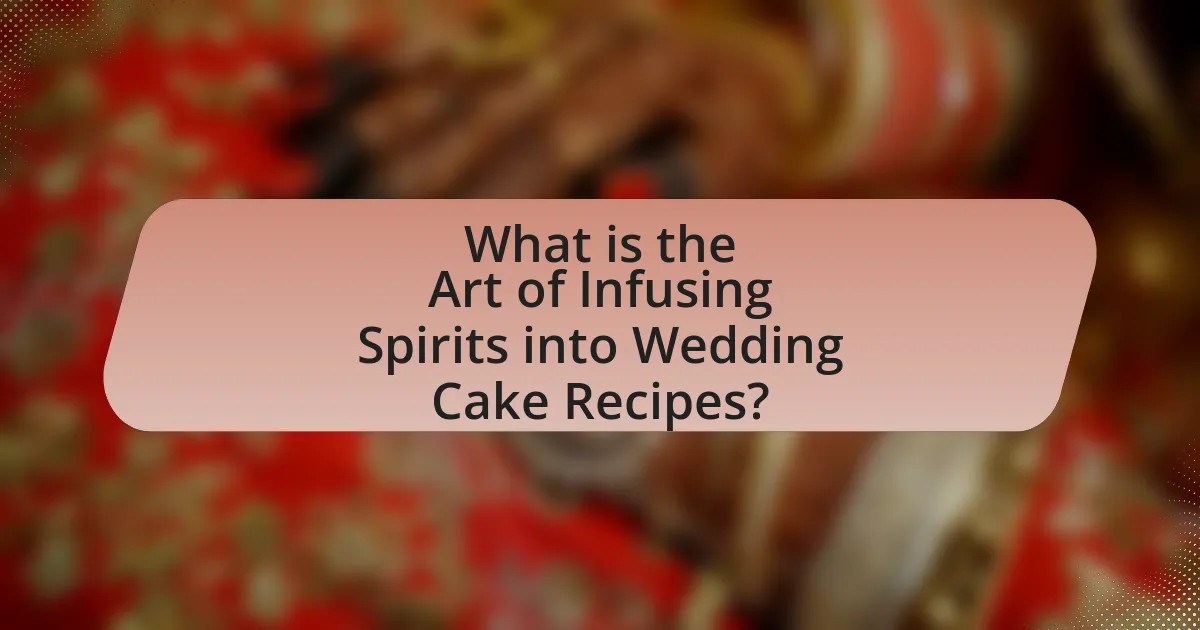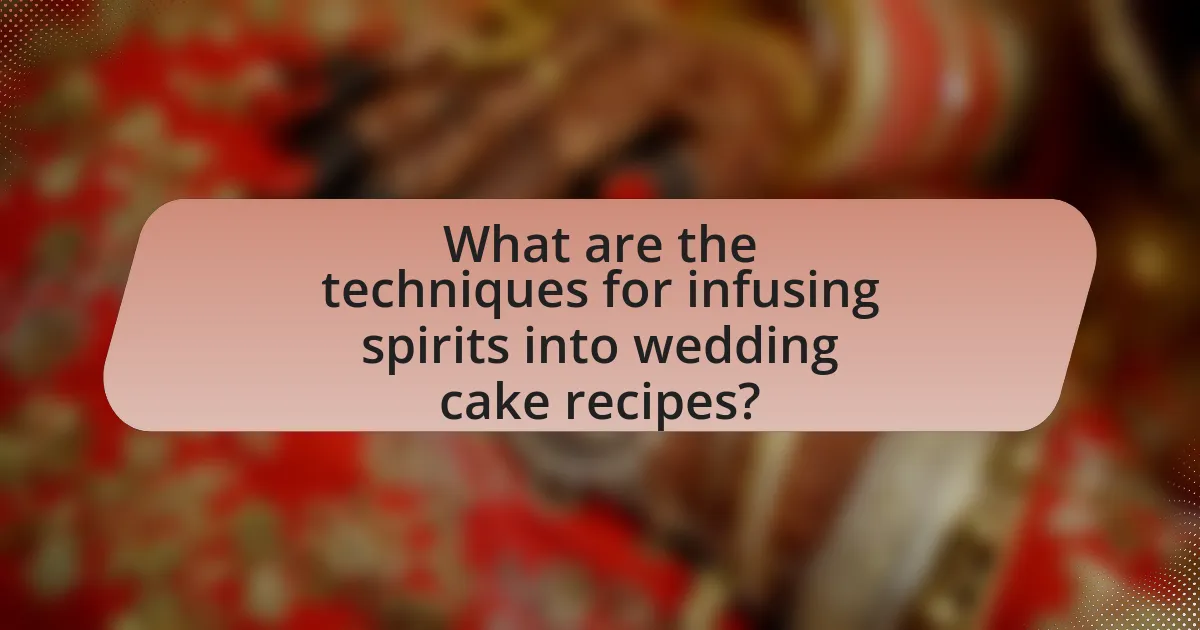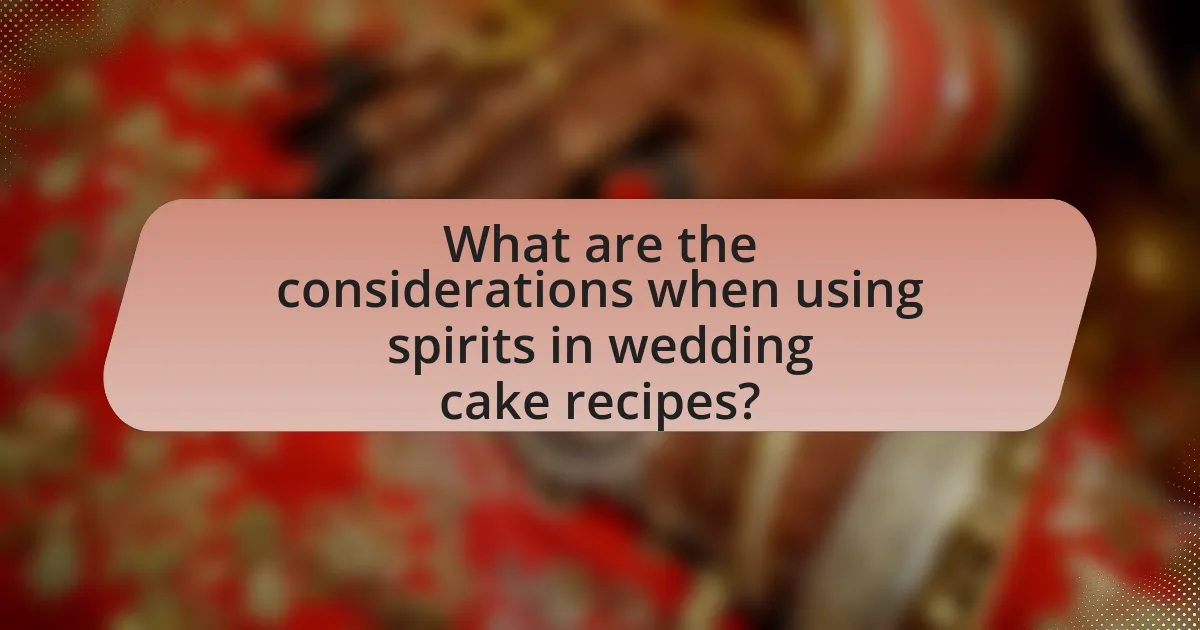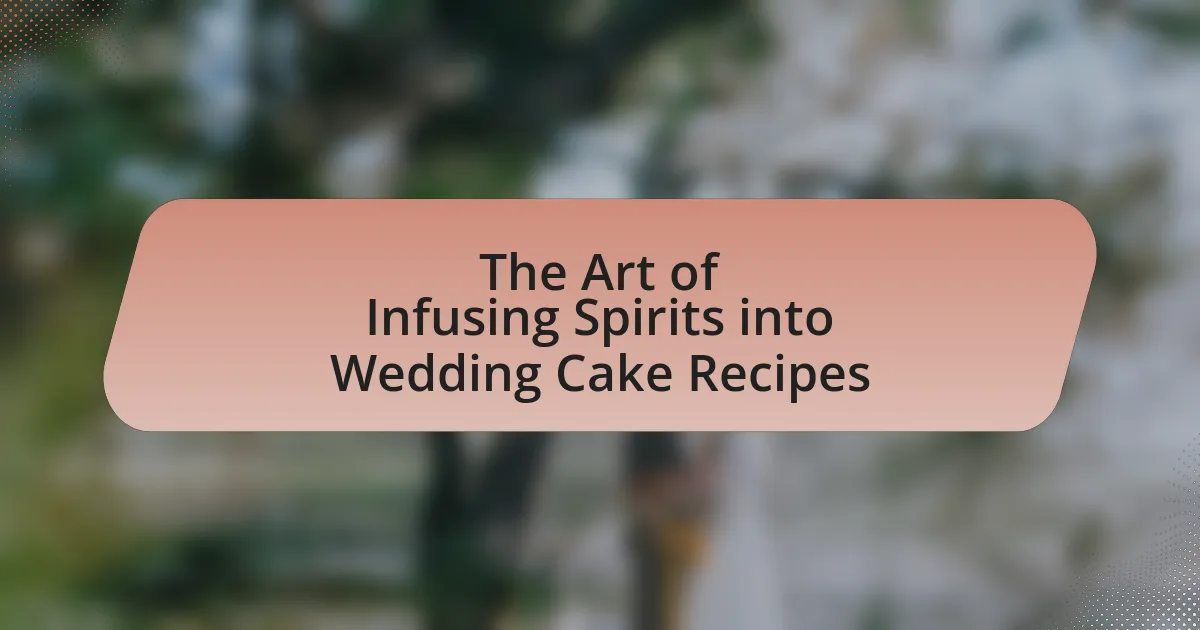The article explores the art of infusing spirits into wedding cake recipes, highlighting how this technique enhances flavor and moisture. It discusses the historical significance of using alcohol in baking, the types of spirits commonly employed, and their impact on cake texture and taste. Additionally, the article covers methods for incorporating spirits during and after baking, best practices for balancing flavors, and considerations for dietary restrictions. It also addresses the growing trend of personalized wedding cakes that reflect couples’ preferences through spirit selection, ensuring a memorable dessert experience.

What is the Art of Infusing Spirits into Wedding Cake Recipes?
The art of infusing spirits into wedding cake recipes involves incorporating alcoholic beverages to enhance flavor and moisture. This technique allows bakers to create rich, complex flavors that complement the cake’s ingredients. For example, rum, whiskey, or champagne can be used to soak cake layers or added directly to the batter, resulting in a more sophisticated taste profile. Historical practices show that spirits have been used in baking for centuries, with recipes dating back to the 18th century highlighting their role in celebratory cakes. The careful selection of spirits and the method of infusion can significantly impact the final product, making it a crucial aspect of wedding cake preparation.
How does infusing spirits enhance wedding cake flavors?
Infusing spirits enhances wedding cake flavors by adding depth and complexity to the overall taste profile. The alcohol in spirits extracts and amplifies the natural flavors of the cake ingredients, such as fruits, spices, and chocolate, creating a more harmonious blend. For example, rum can enhance the richness of a chocolate cake, while citrus-infused vodka can brighten the flavors of a lemon cake. Additionally, spirits can contribute moisture, which helps to keep the cake tender and flavorful. This technique is supported by culinary practices that show how alcohol can enhance flavor perception, as noted in studies on flavor compounds and their interactions in baked goods.
What types of spirits are commonly used in wedding cakes?
Commonly used spirits in wedding cakes include rum, whiskey, and brandy. Rum is often favored for its rich flavor and ability to enhance the cake’s moisture, while whiskey adds depth and complexity. Brandy is also popular, particularly in fruitcake recipes, as it complements dried fruits and spices. These spirits not only contribute to the cake’s taste but also help in preserving it, making them ideal for wedding cakes that may be made in advance.
How do different spirits affect the texture and moisture of the cake?
Different spirits can significantly affect the texture and moisture of a cake by altering its fat content and hydration levels. For instance, spirits like rum and whiskey can enhance moisture retention due to their alcohol content, which can create a more tender crumb. Additionally, the sugars present in certain spirits can contribute to a richer texture, while the acidity in others, such as vodka, can help to strengthen the cake’s structure. Research indicates that the addition of alcohol can also impact the evaporation rate during baking, leading to a denser and moister cake.
Why is the infusion of spirits becoming popular in wedding cakes?
The infusion of spirits is becoming popular in wedding cakes due to the enhanced flavor profiles and the ability to create unique, personalized experiences for couples. Spirits such as rum, whiskey, and champagne add depth and complexity to the cake’s taste, making it more memorable. Additionally, the trend aligns with the growing interest in craft cocktails and artisanal ingredients, allowing couples to reflect their personalities and preferences in their wedding desserts. This popularity is supported by the increasing number of bakeries offering specialized recipes that incorporate various spirits, catering to the demand for innovative and sophisticated wedding cake options.
What cultural or traditional influences contribute to this trend?
Cultural and traditional influences that contribute to the trend of infusing spirits into wedding cake recipes include the historical significance of alcohol in celebrations and regional culinary practices. For instance, in many cultures, spirits like rum or whiskey are traditionally used in cake recipes to enhance flavor and preserve the cake, reflecting customs from the Caribbean and the British Isles. Additionally, the practice of incorporating spirits is often linked to the symbolism of unity and joy in weddings, as seen in various cultures where sharing a drink is a communal act of celebration. This trend is further supported by the growing interest in artisanal and craft spirits, which encourages bakers to experiment with unique flavors, thus enriching the wedding cake experience.
How do couples choose spirits that reflect their personalities?
Couples choose spirits that reflect their personalities by considering their individual tastes, shared experiences, and the overall theme of their wedding. For instance, a couple who enjoys traveling may select a spirit from a country they visited together, while those who appreciate craft cocktails might opt for artisanal spirits that align with their sophisticated palate. This selection process often involves tasting sessions and discussions about their favorite flavors, which helps them identify spirits that resonate with their unique identities. Additionally, the choice of spirit can enhance the wedding cake’s flavor profile, making it a meaningful representation of their relationship.

What are the techniques for infusing spirits into wedding cake recipes?
Techniques for infusing spirits into wedding cake recipes include incorporating the spirit directly into the batter, using it in the soaking syrup, and adding it to the frosting. When adding spirits to the batter, typically 1 to 2 tablespoons of a chosen spirit, such as rum or whiskey, can enhance flavor without overpowering the cake. For soaking syrup, a mixture of equal parts spirit and simple syrup can be brushed onto the cake layers after baking, ensuring moisture and flavor infusion. Additionally, spirits can be mixed into buttercream or fondant to create a cohesive flavor profile throughout the cake. These methods are widely used in baking, as they allow for a balanced integration of alcohol flavor while maintaining the cake’s structural integrity.
How can spirits be incorporated during the baking process?
Spirits can be incorporated during the baking process by adding them directly to the batter or using them in syrups to soak the cake layers. When spirits are mixed into the batter, they contribute moisture and flavor, enhancing the overall taste profile of the cake. For example, adding rum or whiskey can impart rich, complex flavors that complement various cake types. Additionally, creating a syrup with spirits, such as a simple sugar syrup infused with bourbon, allows for a controlled application of flavor and moisture after baking, ensuring the cake remains moist and flavorful. This method is commonly used in wedding cakes to achieve a sophisticated taste that aligns with celebratory themes.
What are the best practices for measuring and mixing spirits into batter?
The best practices for measuring and mixing spirits into batter involve using precise measurements and ensuring even distribution. Accurate measurement is crucial; typically, one to two tablespoons of spirit per cup of batter is recommended to enhance flavor without overpowering the cake. Spirits should be added gradually to the wet ingredients before combining with dry ingredients to ensure thorough mixing. This method prevents clumping and allows for a uniform flavor throughout the batter. Additionally, incorporating spirits at room temperature helps maintain the batter’s consistency. These practices ensure that the infusion of spirits enhances the overall taste and texture of the wedding cake.
How does the timing of infusion impact flavor development?
The timing of infusion significantly impacts flavor development by determining how long the ingredients interact with the liquid, which influences the extraction of flavors. Longer infusion times typically result in a more intense and complex flavor profile, as compounds from the ingredients are gradually released into the spirit. For example, a study published in the Journal of Food Science found that infusing fruits in spirits for extended periods can enhance the depth of flavor, as the alcohol extracts both volatile and non-volatile compounds. Conversely, shorter infusion times may yield a milder flavor, as not all desired compounds have sufficient time to dissolve. Thus, the timing of infusion is crucial in achieving the desired flavor intensity and complexity in infused spirits for wedding cake recipes.
What are the methods for infusing spirits post-baking?
The methods for infusing spirits post-baking include soaking, spraying, and glazing. Soaking involves immersing the baked cake in a mixture of spirits and simple syrup, allowing the flavors to penetrate the cake. Spraying entails using a spray bottle to evenly distribute a spirit mixture over the cake’s surface, enhancing flavor without making it overly moist. Glazing involves brushing a spirit-infused glaze over the cake, which adds flavor and a shiny finish. These techniques are commonly used in baking to enhance the overall taste and aroma of wedding cakes.
How can soaking syrup enhance the cake’s flavor profile?
Soaking syrup enhances a cake’s flavor profile by allowing the cake to absorb moisture and infuse additional flavors directly into its structure. This process not only increases the cake’s overall juiciness but also deepens the taste experience by incorporating complementary flavors, such as vanilla, citrus, or spirits, which can elevate the cake’s complexity. For instance, a study published in the Journal of Culinary Science & Technology highlights that flavor absorption occurs more effectively when cakes are soaked with syrups containing alcohol, as the alcohol can carry flavor compounds that enhance the cake’s taste.
What are the advantages of using flavored spirits versus unflavored ones?
Flavored spirits offer enhanced taste and aroma compared to unflavored ones, making them ideal for infusing wedding cakes. The infusion of flavors from fruits, herbs, or spices can elevate the overall sensory experience of the cake, creating a more memorable dessert. For instance, using a citrus-flavored vodka can impart a refreshing zest, while a spiced rum can add warmth and complexity. Additionally, flavored spirits often contain added sugars or sweeteners, which can contribute to the cake’s moisture and sweetness, improving texture and flavor balance. This versatility allows bakers to customize their creations, catering to specific preferences and themes, ultimately enhancing the enjoyment of the wedding cake.

What are the considerations when using spirits in wedding cake recipes?
When using spirits in wedding cake recipes, it is essential to consider the flavor profile, alcohol content, and the potential impact on texture and moisture. The flavor profile should complement the cake’s other ingredients, enhancing rather than overpowering them; for example, rum pairs well with fruit cakes, while whiskey can enhance chocolate flavors. The alcohol content is crucial, as high levels can affect the cake’s rise and texture; typically, using spirits in moderation, around 1 to 2 tablespoons, is advisable to maintain balance. Additionally, spirits can contribute to the cake’s moisture, but excessive amounts may lead to a soggy texture, so careful measurement is necessary.
How do dietary restrictions affect the choice of spirits in wedding cakes?
Dietary restrictions significantly influence the selection of spirits used in wedding cakes. For instance, gluten-free diets necessitate the use of gluten-free spirits, such as certain vodkas or rums, to ensure the cake remains compliant with dietary needs. Additionally, vegan diets require the exclusion of spirits that may contain animal-derived ingredients, prompting the use of plant-based alternatives. Furthermore, religious dietary laws, such as those observed in kosher or halal practices, dictate the choice of spirits to ensure they meet specific guidelines. These considerations ensure that the wedding cake is inclusive and suitable for all guests, reflecting the couple’s commitment to accommodating diverse dietary needs.
What alternatives exist for non-drinkers or those with allergies?
Non-drinkers or those with allergies can use non-alcoholic alternatives such as fruit juices, flavored syrups, or herbal teas in wedding cake recipes. These substitutes provide flavor without the alcohol content, making them suitable for individuals avoiding alcohol due to personal choice or health reasons. For instance, using pomegranate juice can add a rich flavor and color, while vanilla or almond extract can enhance sweetness without allergens. Additionally, many brands offer non-alcoholic spirits that mimic traditional flavors, allowing for a similar taste experience without the adverse effects of alcohol or allergens.
How can the alcohol content be managed for a family-friendly cake?
To manage the alcohol content for a family-friendly cake, one effective method is to reduce the amount of alcohol used in the recipe or substitute it with non-alcoholic alternatives. For instance, if a recipe calls for a cup of rum, using a quarter cup of rum combined with three-quarters cup of fruit juice or flavored syrup can maintain flavor while significantly lowering alcohol content. Additionally, baking the cake at a high temperature for an extended period can evaporate much of the alcohol, as studies show that cooking can reduce alcohol content by up to 85% depending on the cooking time and method. This approach ensures that the cake remains suitable for all ages while still delivering a delicious taste.
What are the best practices for balancing flavors in spirit-infused cakes?
The best practices for balancing flavors in spirit-infused cakes include using complementary flavors, adjusting sweetness, and controlling the amount of spirit added. Complementary flavors enhance the overall taste; for example, pairing dark rum with chocolate or citrus vodka with lemon cake creates a harmonious blend. Adjusting sweetness is crucial, as spirits can add bitterness or sharpness; therefore, reducing sugar in the recipe can help maintain balance. Controlling the amount of spirit is essential; typically, one to three tablespoons per cup of batter is recommended to avoid overpowering the cake while still imparting flavor. These practices ensure a well-rounded taste profile in spirit-infused cakes.
How can one ensure that the spirit does not overpower the cake’s taste?
To ensure that the spirit does not overpower the cake’s taste, one should carefully balance the amount of spirit used in the recipe. Typically, using a small quantity, such as one to two tablespoons per cup of batter, allows the flavor of the spirit to enhance rather than dominate the cake. Additionally, selecting spirits with complementary flavors, such as vanilla or almond liqueurs for a vanilla cake, can create harmony between the cake and the spirit. This approach is supported by culinary practices that emphasize flavor balance, ensuring that the cake remains the primary taste experience while the spirit adds depth.
What role do complementary flavors play in the infusion process?
Complementary flavors enhance the infusion process by creating a harmonious balance that elevates the overall taste profile of the infused spirit. When flavors complement each other, they can intensify the desired characteristics of the infusion, making it more complex and enjoyable. For instance, pairing citrus with herbal notes can result in a refreshing and layered flavor, which is particularly effective in wedding cake recipes where a nuanced taste is essential. This synergy between flavors not only improves the sensory experience but also ensures that the infusion integrates well into the cake, contributing to a cohesive flavor throughout the dessert.
What tips can help in successfully infusing spirits into wedding cakes?
To successfully infuse spirits into wedding cakes, use a balanced approach by selecting the right type of spirit and incorporating it at the appropriate stages of the baking process. Spirits such as rum, whiskey, or flavored liqueurs can enhance the cake’s flavor profile when used in moderation. For optimal results, consider soaking the cake layers in a simple syrup mixed with the chosen spirit after baking, which allows for even distribution and moisture retention. Additionally, incorporating spirits into the frosting or ganache can further enhance the flavor without overwhelming the cake. Research indicates that the alcohol content evaporates during baking, leaving behind the flavor, making it essential to use spirits that complement the cake’s ingredients.
How can bakers experiment with different spirit combinations effectively?
Bakers can experiment with different spirit combinations effectively by starting with small batches to assess flavor profiles and interactions. This method allows bakers to gauge how various spirits, such as rum, whiskey, or liqueurs, influence the overall taste and texture of the cake without risking large quantities of ingredients. For instance, a study published in the “Journal of Culinary Science & Technology” highlights that the alcohol content and flavor notes of spirits can significantly alter the sweetness and moisture levels in baked goods. By documenting each combination and its outcomes, bakers can refine their recipes based on specific preferences and feedback, ensuring a balanced infusion that enhances the wedding cake experience.
What common mistakes should be avoided when infusing spirits into cakes?
Common mistakes to avoid when infusing spirits into cakes include using too much alcohol, which can lead to a soggy texture and overpowering flavor. Additionally, not allowing the cake to absorb the spirit properly can result in uneven flavor distribution. It is also important to choose the right type of spirit that complements the cake’s flavor profile; for instance, using a strong whiskey in a delicate vanilla cake may clash. Lastly, neglecting to account for the alcohol’s evaporation during baking can lead to a less pronounced flavor than intended. These mistakes can significantly affect the overall quality and taste of the cake.
